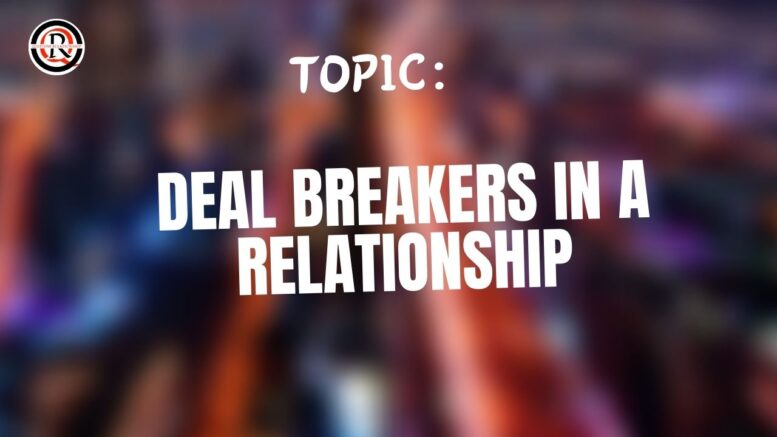What are deal breakers in a relationship?
Deal breakers in a relationship are the non-negotiable aspects that can lead to its demise. These red flags, when ignored, can poison the foundation of love. Infidelity, lack of trust, and dishonesty are prime deal breakers that erode the very essence of a partnership. Incompatibility, whether it be in values, goals, or communication styles, can cause irreparable damage.
Substance abuse, violence, and abuse, both physical and emotional, should never be tolerated. Financial irresponsibility, a lack of emotional support, and constant disrespect can erode the bond between two individuals. Lack of effort, unwillingness to compromise, and a refusal to address problems constructively are also detrimental to a healthy relationship.
What are some deal breakers in a relationship?
Deal breakers in a relationship are factors or behaviors that can lead to the end of a partnership. Here are some deal breakers:
Infidelity: Cheating or being unfaithful is often considered a major deal breaker.
Lack of trust: Without trust, a relationship becomes unstable and unhealthy.
Dishonesty: Consistent lying or deception erodes the foundation of trust.
Incompatibility: Fundamental differences in values, life goals, or interests can strain a relationship beyond repair.
Substance abuse: Persistent drug or alcohol abuse can cause immense harm to both individuals and the relationship.
Abuse: Any form of physical, emotional, or verbal abuse should never be tolerated.
Financial irresponsibility: Irreconcilable differences in financial management and irresponsibility can lead to serious conflicts.
Lack of communication: Inadequate or ineffective communication can create misunderstandings and distance.
Disrespect: Constant disrespect, belittling, or disregard for one another’s feelings is toxic.
Unwillingness to compromise: Relationships require compromise and a willingness to meet each other’s needs.
Different life goals: If partners have drastically different aspirations and cannot find a middle ground, it can lead to a relationship’s demise.
Lack of emotional support: A lack of empathy, understanding, and emotional support can cause deep dissatisfaction.
Constant criticism: Continuous criticism and a lack of appreciation can erode self-esteem and relationship satisfaction.
Control and manipulation: When one partner tries to control or manipulate the other, it creates an unhealthy power dynamic.
Lack of effort: If one partner consistently neglects the relationship or fails to put in the necessary effort, it can breed resentment and dissatisfaction.
Remember, every individual and relationship is unique, and what constitutes a deal breaker may vary. It’s important to establish boundaries and communicate openly with your partner to maintain a healthy and fulfilling relationship.
What are 5 deal breakers in a relationship?
Here are five common deal breakers in a relationship:
Infidelity: Cheating or being unfaithful is often seen as a significant breach of trust and can cause irreparable damage to a relationship.
Abuse: Any form of physical, emotional, or verbal abuse is a clear deal breaker. It is crucial to prioritize your safety and well-being in a relationship.
Lack of respect: Mutual respect is essential for a healthy partnership. Continuous disrespect, belittling, or dismissive behavior can erode the foundation of love and trust.
Incompatibility: Fundamental differences in values, life goals, or interests can create constant conflicts and make it challenging to sustain a fulfilling relationship in the long term.
Dishonesty: Consistent lying, hiding important information, or being deceitful undermines trust and creates an atmosphere of uncertainty and insecurity.
It is important to remember that deal breakers may vary from person to person, and individual boundaries and priorities differ. It is crucial to establish open and honest communication with your partner to ensure that both parties’ needs and expectations are met in a healthy and respectful manner. Read more: How To Break Up With Someone
Common deal breakers in relationships
Other common deal breakers in relationships can include:
Infidelity: Cheating or being unfaithful is a significant breach of trust and often considered a deal breaker.
Lack of communication: Inadequate or ineffective communication can lead to misunderstandings, resentment, and feelings of disconnection.
Lack of trust: Trust is the basic fundamental of any relationship. Continuous mistrust or broken promises can erode the bond between partners.
Incompatibility: Fundamental differences in values, beliefs, or life goals can create ongoing conflicts and make it challenging to build a strong and harmonious partnership.
Abuse: Any form of physical, emotional, or verbal abuse is a clear and immediate deal breaker. It is essential to prioritize your safety and well-being.
Lack of respect: Mutual respect is crucial for a healthy relationship. Consistent disrespect, belittling, or disregarding each other’s boundaries can be detrimental.
Different priorities: When partners have conflicting priorities or diverging paths in life, it can create tension and hinder the growth of the relationship.
Financial issues: Irresponsible financial behavior, constant financial disagreements, or incompatible attitudes towards money management can strain a relationship.
Lack of emotional support: Emotional support and understanding are vital in a relationship. A consistent absence of emotional support can lead to feelings of loneliness and dissatisfaction.
Addiction: Substance abuse or any form of addiction can place a tremendous strain on a relationship and hinder trust, stability, and overall well-being.
It’s important to recognize that deal breakers may vary from person to person, and what is a deal breaker for one individual may not be for another. Each person should identify their own boundaries and communicate openly with their partner to ensure a healthy and fulfilling relationship.
Funny deal breakers in a relationship
While deal breakers are usually serious matters, here are some lighthearted and humorous deal breakers that might bring a smile to your face:
Putting pineapple on pizza: If one partner insists on topping their pizza with pineapple, while the other vehemently opposes it, it could lead to irreconcilable differences!
Squeezing the toothpaste tube from the middle: Some people just can’t handle the chaos and disorder of toothpaste tubes being squeezed from anywhere other than the end.
Spoiler alerts: Constantly revealing plot twists and spoilers for movies, TV shows, or books could strain a relationship for those who love the element of surprise.
Snoring like a freight train: Sleeping next to someone who sounds like a chainsaw can test the limits of one’s sanity and potentially become a deal breaker.
Pet peeves about pet peeves: When a partner has a long list of trivial annoyances, like the way someone chews or breathes, it might be challenging to find harmony.
A strange obsession with collecting odd items: It might be difficult to see a future with someone who insists on filling every inch of the house with rubber ducks or garden gnomes.
An irreconcilable mismatch in TV show preferences: When one partner wants to binge-watch reality shows, while the other is an ardent sci-fi fan, finding common ground on what to watch can be a challenge.
An irrational fear of clowns: If one partner is terrified of clowns and the other loves attending the circus, it could be a deal breaker when it comes to choosing entertainment options.
Remember, while these examples are humorous, deal breakers are subjective, and what may be funny to some might be significant to others. It’s essential to have open and honest communication about your preferences and concerns with your partner to navigate potential deal breakers in a relationship.
How to figure out your deal breakers in a relationship?
Figuring out your deal breakers in a relationship requires self-reflection and understanding your personal boundaries and needs. Here are some steps to help you identify your deal breakers:
Reflect on past experiences: Look back at previous relationships or situations that made you feel uncomfortable, unhappy, or unfulfilled. Consider what specific behaviors or circumstances led to the downfall of those relationships.
Identify your core values: Determine what values are essential to you in a relationship. These could include trust, honesty, respect, loyalty, communication, or shared interests. Consider which values are non-negotiable for you.
Assess your emotional well-being: Consider what emotional needs are important for you to feel secure, loved, and supported in a relationship. Think about the kind of emotional connection and support you desire from a partner.
Set personal boundaries: Reflect on the boundaries you need to establish for your emotional, physical, and mental well-being. Consider what behaviors or actions you find unacceptable or detrimental to your overall happiness.
Reflect on your life goals: Consider your long-term aspirations and goals, both individually and as a couple. Assess whether potential partners align with your goals or have conflicting paths that could create tension or hinder your personal growth.
Communicate and observe: When you start dating someone, communicate openly about your values, expectations, and needs in a relationship. Pay attention to how they respond and whether their actions align with their words.
Trust your intuition: Listen to your gut instincts. If something feels off or triggers discomfort, acknowledge and explore those feelings. Trusting your intuition can help you recognize potential deal breakers early on.
Learn from your past: Use your past experiences as learning opportunities to refine your understanding of deal breakers. Adjust your expectations and boundaries based on lessons learned.
Remember that deal breakers are personal and may vary from person to person. It’s important to be clear about your deal breakers but also open to compromise and understanding. Communication with your partner is crucial to ensure that both parties’ needs and boundaries are respected in a healthy and fulfilling relationship.
Conclusion
In conclusion, deal breakers in a relationship are the boundaries and non-negotiable aspects that can lead to the end of a partnership. Identifying your deal breakers requires self-reflection, understanding your values, emotional needs, and personal boundaries. Reflecting on past experiences, assessing your core values, and considering your long-term goals can help you determine what is essential to you in a relationship.
Communication, both with yourself and with your partner, is key in navigating potential deal breakers. Trusting your instincts and learning from past experiences can guide you in recognizing and addressing deal breakers early on. By being clear about your deal breakers while remaining open to compromise, you can build a healthy and fulfilling relationship that aligns with your needs and values.






Be the first to comment on "Deal breakers in a relationship"